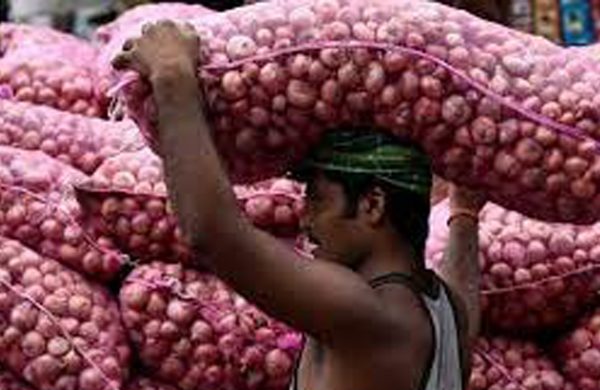Onion syndicates? Try onion shortages
- Update Time : Monday, July 8, 2024

TDS Desk:
The farmers of Pabna, the country’s major onion growing hub, are encouraged by high onion prices, and will probably produce more onion in the next season, findings of a field visit suggest.
However, Bangladesh often imports onions and the market price of onion in that case is determined in keeping with the price of imported onions.
Various stakeholders agree since onion is a perishable item that loses weight quickly, and there are thousands of traders, and hundreds of importers active in the market, apart from the growers, it is impossible for them to form a “syndicate” or cartel.
Farmers harvest onions first in December and then in March. They try to store onions at home to sell them a month or two after the harvest, when the price is usually higher, says Krishibid Abu Taher, who works for a private company which sells fertilizer. However, the weight of onions decreases significantly during storage, resulting in an increase in cost.
Onions cannot be grown during the rainy season, from June to August, when onions are usually imported. During this time, Krishibid Abu Taher explained, the price depends on the price of imported onions. In 2023, onion prices shot up when India stopped exporting onions, fearing increasing onion prices in India.
“During part of the year, most of the onions on the market are expensive imported onions. And traders with large stocks of local onions will naturally sell their stock at a price which is close to the price of imported onions,” Krishibid Abu Taher added. That is simply speculation, which is perfectly legal.
Onions can be stored in cold storage, but farmers prefer not to do so, because onions which have been in cold storage have a short shelf life after they are removed from cold storage.
Md Hafizul Islam, a farmer of Ghonoshyampur village in Sujanagar, Pabna, produced 150 maunds (each maund equals 40 kilograms) of onion cultivating an acre of land in the past season. He sold each maund for Tk 1,500-1,600 initially in March and Tk 3,500 in late June.
“We farmers try not to sell all the onions we produce during the harvest as the price is low then. We stock a major portion at home, and once supply decreases we sell our onions at a better price,” he told this journalist during a field visit.
The farmer pointed out that onions cannot be preserved for a long time, as they either spoil, or lose one-fourth of their weight or more. Hafizul says that when farmers adjust their selling price in consideration of weight loss, some people complain that the price has gone up unfairly.
Discussing the supply and market price of onions, a number of local bepari (traders who collect onion from farmers and sell to wholesalers in cities) in Bonogram, Bera and Kashinathpur of Pabna and Taherpur Haat, Bishot Haat and Malonchibazar of Natore, mentioned that farmers and traders are not in a position to manipulate the price of onion since supply comes from other parts of the country too, and sometimes from imports.
Tofazzal Hossain of Bera has been engaged in the onion trade for three decades. He supplies around 80 tons of onions to wholesalers in Dhaka every month. “Farmers sell some onions during the harvest to meet their family needs, but they try to preserve most of their produce and sell in phases. The price goes up because of lower supply and also higher demand in Dhaka,” he said.
Some Natore farmers claimed that they doubled onion yield to 120 maunds in each 33 decimals compared to their Pabna friends. Ashraful Pramanik of Natore Sadar said this perishable item cannot be preserved the way potatoes or wheat can be stocked. “As onions lose weight by almost 30 per cent in six months, the effective selling price of a farmer stands at Tk 60 a kg even when he manages to sell it at Tk 100 a kg.”
Mohammad Nekbar, a trader of Mollapara in Noldanga, Natore, has been supplying onions to a number of wholesalers in Dhaka and some other districts. “The production in India and the export price fixed there sometimes affects the market in Bangladesh. If the onion price remains at the current level in the local market, our farmers will feel incentivized to grow more onions,” he suggested.
Different government agencies have differing statistics about onion production, making the production uncertain. However, import data show about 200 importers imported almost one million tons of onion, mostly from India, China and the Netherlands.
“Restrictions on exports of onion in India in the past few years adversely affected prices in the Bangladesh market. But certain quarters accused importers and traders of hoarding and price manipulation despite having no evidence,” said Manjurul Islam, an importer of Shyambazar in old Dhaka.
He pointed out that if anyone stocks onions for a long time seeking higher profit, he would suffer losses due to spoilage and weight loss. He said that the idea of forming a syndicate in such a market is absurd.


















